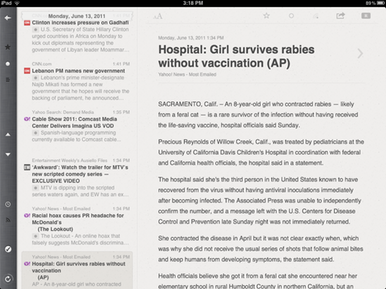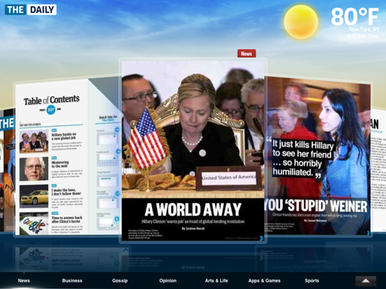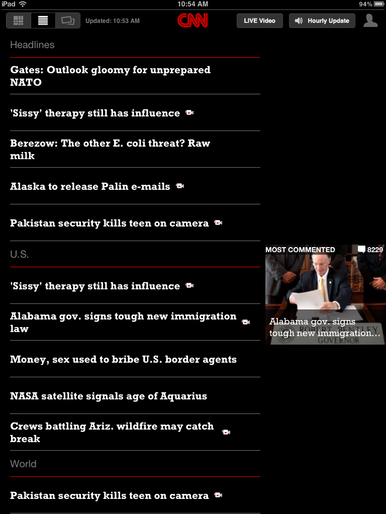
Instant Pages is among the new search features introduced today by Google Fellow Amit Singhal and team.
(Credit: Screenshot by CNET) 
Google Fellow Amit Singhal leads today's briefing. Here he answers a question during the Q&A session.
(Credit: Screenshot by CNET) Editor's note: We used Cover It Live for this event, so if you missed the live blog, you can still replay it in the embedded component at the end of this post. Replaying the event will give you all the live updates along with commentary from our readers and CNET reporters. For those of you who just want the basic updates, we've posted an edited transcript below. You can also read a summary post on the briefing, or individual posts on the mobile search refresh, boosted voice and image search, and the new Instant Pages feature.
SAN FRANCISCO--At its "Inside Search" briefing this morning, the Internet giant is unveiling
new mobile and desktop search features, and we're covering them live. The new features make it easier to enter search queries and view results through icons, images, and voice commands.
In September--the last time Google hosted a similar event--it launched
Google Instant, the search feature that updates results as users type queries.
To follow the event, click on the Cover It Live Module below. The event kicked off at 9:30 a.m. PT.
Transcript of live blog starts here:
9:34 a.m. PT (CNET's Jay Greene): The event begins...Gabriel Stricker, Google PR man, is taking care of logistics now.

Gabriel Stricker, Google director of global communications and public affairs, takes care of logistics.
(Credit: Screenshot by CNET) 9:35 a.m. And here comes Amit Singhal, a Google Fellow who is running the show today.
 (Credit: Screenshot by CNET)
(Credit: Screenshot by CNET) 9:36 a.m.: Amit: Today we will talk a lot about how search is breaking barriers between you and the knowledge you seek. Also a focus later on Google Instant.
9:37 a.m.: Amit: With search, we strive to make sure there are no derailments in your train of thought. Search is all about removing these barriers between you and the knowledge you seek. Search hampered often because folks are not in front of their computers. Hard to find the information you seek that way.
9:38 a.m.: Amit is about to focus on mobile.
 (Credit: Screenshot by CNET)
(Credit: Screenshot by CNET) 9:39 to 9:40 a.m.: Amit showing the search traffic for desktop queries. Starts high on Monday and tapers down through the week. And on the weekend, it falls off the cliff. The search data on mobile shows an almost inverse version of the desktop chart. Folks pull out their mobile devices when they're out and about on the weekends. Now he's showing desktop traffic over the course of the day. Somewhat obvious, but it builds during the day and tapers toward the evening.
 (Credit: Screenshot by CNET)
(Credit: Screenshot by CNET) 9:41-9:42 a.m.: In mobile search, traffic climbs during the day, but peaks in the evening, just as it tapers on the desktop. Dissecting even farther, there's a slight bump in mobile at noon, when folks are presumably at lunch, at the same time, the desktop search traffic, dips.
 (Credit: Screenshot by CNET)
(Credit: Screenshot by CNET) 9:44 a.m.: Amit showing that mobile search doesn't slow down over holidays. It keeps growing. A bit opportunity for Google.
 (Credit: Screenshot by CNET)
(Credit: Screenshot by CNET) 9:45 a.m.: Amit on Google's search results: It's like playing a billion rounds of golf and getting a hole in one almost every time.
9:46-9:47 a.m.: On mobile, it's even more critical that you get the results right the first time. Amit repeats Google mantra: "Speed is still the killer app." The point here is that it's more important on mobile. Scott Huffman, engineering director, takes the stage.
 (Credit: Screenshot by CNET)
(Credit: Screenshot by CNET)  (Credit: Screenshot by CNET)
(Credit: Screenshot by CNET) 9:48-9:50 a.m.: Scott: In early mobile search days, the mobile searches were simple and "kinda boring." Smartphones have changed that. Searches became more complex, such as planning a trip or doing research. Google working on making it easier to enter search queries and easier to view results. Demo: mobile search with icons to help with local results. Click on restaurants and it finds something nearby for you.

Scott Huffman, Google engineering director, takes the stage.
(Credit: Screenshot by CNET) 9:51-9:52 a.m.: Tap on the link and the restaurant info quickly pops up on the screen. The tabs also include local search for coffee and bars. Adding Google Instant to mobile. Type "S" and, if your history shows a frequency of going to the S&P Index, it quickly pops up for you to chose.
 (Credit: Screenshot by CNET)
(Credit: Screenshot by CNET) 9:53-9:54 a.m.: A little more complex search now. Scott jokes that if the event doesn't go well, Amit will send him to Siberia. Now he's using his phone to find a hotel in Russia. Google adds a "+" to build out the query. Type in Hilton and plus offers deeper search results.
 (Credit: Screenshot by CNET)
(Credit: Screenshot by CNET) 9:55 a.m.: Google will also offer previews of Web pages so users can choose what page they want to navigate to without having to load the whole page.
 (Credit: Screenshot by CNET)
(Credit: Screenshot by CNET) 9:56 a.m.: Now a new
tablet search UI. Better use of page, bigger images, for example, in image search. Google's included infinite scroll on tablets for images.
 (Credit: Screenshot by CNET)
(Credit: Screenshot by CNET) 9:57 a.m.: Now Google Goggles will be able to translate into Russian. He's using the phone to take a photo of a Russian menu. The image is automatically translated to English.
9:59 a.m.: Moving on to searching by voice. Mike Cohen, manager of speech technology, takes the stage.

Mike Cohen, manager of speech technology, takes the stage.
(Credit: Screenshot by CNET) 9:59 a.m-10:05 a.m..: Cohen: In the past year, mobile speech inputs at Google have grown by a factor of six. Two years of nonstop speech comes into Google's mobile search every day. But still, this is just the beginning. We're working on improving accuracy because, Google has found, the higher its accuracy, the more often people use voice search. Google feeds the system 230 billion words, which takes the equivalent of decades worth of CPU time. Google has made every app on
Android speech-enabled. Developers haven't had to add anything to make use of it.
 (Credit: Screenshot by CNET)
(Credit: Screenshot by CNET) 10:05 to 10:06 a.m.: Johanna Wright, director of product management for search, takes the stage. Johanna: Google is bringing mobile innovations to the desktop. She tells a story about her husband using his phone to translate squirrel to Spanish when the two of them went for a walk.

Johanna Wright, director of product management for search, takes the stage.
(Credit: Screenshot by CNET) 10:08-10:10 a.m.: Google announcing voice search on the desktop. Another step toward natural user interface. There will be a microphone in the search box on the desktop. She asks for a recipe for spaghetti with bolognese sauce. And up it pops on the desktop. Journalists typing away while Googlers in the back of the room applaud. A bit odd, to be honest. But this is the most interesting announcement so far.
 (Credit: Screenshot by CNET)
(Credit: Screenshot by CNET) 10:11-10:15 a.m.: Johanna announces search by image on the desktop. Johanna announces search by image on the desktop. It will offer the ability to locate a photo from the image itself. So users can drop an image into the search box, and the search engine finds similar images online. The example used takes a 10-year-old photo of a Greek island vacation. The search engine identifies where it is. They drop the Y U NO Guy into the box and Google Search dishes up results that explain who or what it is. Search by image uses similar features at Google Goggles. It runs the various points of the image against millions of images online to achieve more accurate results.
 (Credit: Screenshot by CNET)
(Credit: Screenshot by CNET)
 (Credit: Screenshot by CNET)
(Credit: Screenshot by CNET) 10:16-10:17 a.m.: There will be Chrome and
Firefox extensions to do the search, in addition to drag and dropping the photo into the search box. Again, a pretty cool feature. More interesting, to me, than the mobile stuff that came earlier. Amit is back on stage.
10:19-10:20 a.m.: Moving onto Google Instant now. Google Instant is now available in 32 languages on 69 domains. Google Instant will work on Google image search in the coming weeks. He shows a video of how it works--type fast and fastest car comes up as a possible choice with photos of, you guessed it, fast cars.
10:21-10:23 a.m.: Amit: flipping channels on a TV is much faster than loading a Web page. Entering a query takes an average of 9 seconds. Selecting a result takes on average 15 seconds. Google Instant shaves times off both ends of that equation. Page loads, on average in five seconds. What can Google do about that?
 (Credit: Screenshot by CNET)
(Credit: Screenshot by CNET) 10:23-10:29 a.m.: Next news: Google Instant Pages. Next news: Google Instant Pages. With Instant Pages, the page loads, well, practically instantly. Google says The Washington Post page loads in 3.2 seconds without Instant Pages and in 0.0 seconds with Instant Pages. Amit: The time it saves us is just amazing. 3 to 5 seconds per page. An average Web page is 700 kilobytes in size. With that large a page, in addition to serving ads and other items, "no wonder" it's so slow.
 (Credit: Screenshot by CNET)
(Credit: Screenshot by CNET) 10:30-10:32 a.m.: Google is loading more data in cases where it's confident that users will click on the link. It pre-renders the information. With Google Instant and with Instant Pages, users can save 4 to 10 seconds with each query. Instant Pages will be available this week in Chrome. Instant Pages coming to mobile soon. No date given.
10:33 a.m.: Amit: Our job is to get you the information you seek "in the blink of an eye."
10:33 a.m.: And the presentation ends. Now onto Q&A.
 (Credit: Screenshot by CNET)
(Credit: Screenshot by CNET) 10:36-10:38 a.m.: Amit expects Instant Pages to move to Firefox. The code is available. Instant pages works for normal results, not for advertising. At least, not yet. Pre-rendering goes farther than earlier iterations, downloading more data than previous attempts. Google's implementation is also better because its relevance is better than others who have attempted to do things similar.
10:39 a.m.: Voice search on the desktop is available in Chrome only for now.
10:40 a.m.: Local search results will include recommendations from friends through HotPot.
10:45 a.m.: Amit (re: search by image): The images do not become public. The image is treated with the same privacy constraints as other queries.
10:49 a.m.: Amit (re: Bing): At Google we believe that competition is good. The fastest innovator will win. We are focused on users saving time, doing the things they want to do.
10:50 a.m.: Alan Eustace, senior VP of knowledge: We have a long set of challenges and opportunities that we're laser-focused on now.
10:51 a.m.: Amit: We would very much like all browsers to take on these standards. Right now, much of today's announcements work only, or work best, on Chrome and Android.
10:53 a.m.: Google does not do face recognition. (That should avoid some regulatory hurdles, particularly in Europe.)
10:54-10:55 a.m.: Eustace: We did have a reorganization recently. Now, more focused on product areas. Larry Page's view of search is much broader than the way Google had approached it. "(Page's) view is that Google should be much better at understanding the world." That should make search better.
10:56 a.m.: (Jay Greene) That's why Eustace is SVP of knowledge, not search.
10:56 a.m.: Eustace: "It's really elevated the importance of search in the organization."
10:59-11 a.m.: Instant Pages only triggers when it's very confident that the page that pre-renders is exactly what the user wants. Instant Pages always loads a single page, which is usually the top page in results.
11:02 a.m.: Search by image works best when there are a lot of images of that site. It won't work well of homes, for example, that aren't often photographed. So it's less likely to be able to determine the owner of a specific residence if a photo of that home is used in the query. (An answer to a question about privacy.)
11:05 a.m.: Amit: The faster Google renders information, the more often people search. Google is going to keep pressing on speed.
11:06-11:08 a.m.: And that's a wrap. The most interesting news today, it seems, was search by voice on the desktop, search by image, and Google Instant Pages. There were also interesting, but less compelling announcements about new icons to make mobile search more relevant. We'll be following those announcements today and in the coming days on CNET. Hope you join us there. For now, goodbye.
source: http://news.cnet.com/8301-1023_3-20070940-93/google-touts-search-breakthroughs-live-blog/?tag=cnetRiver








































